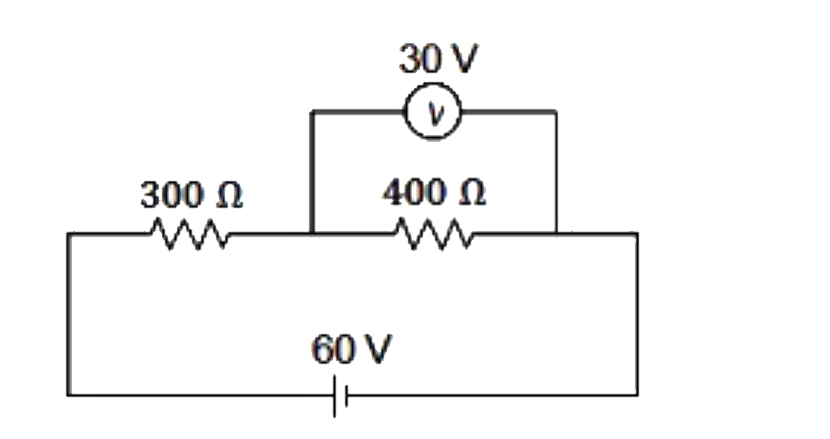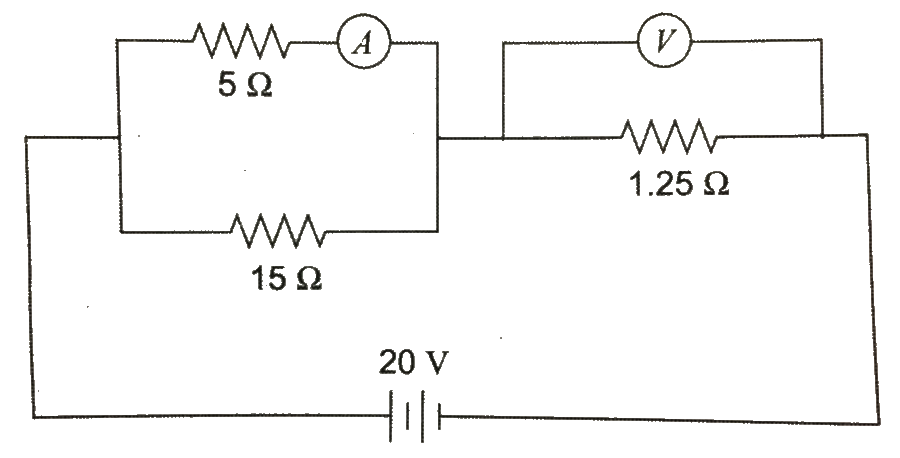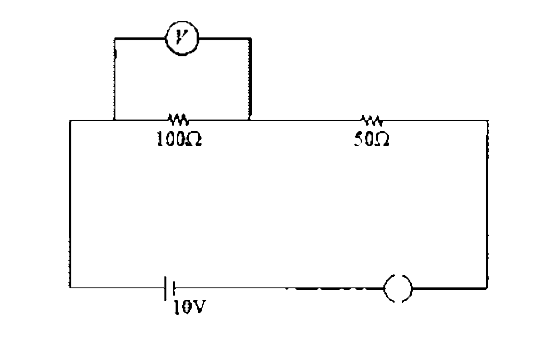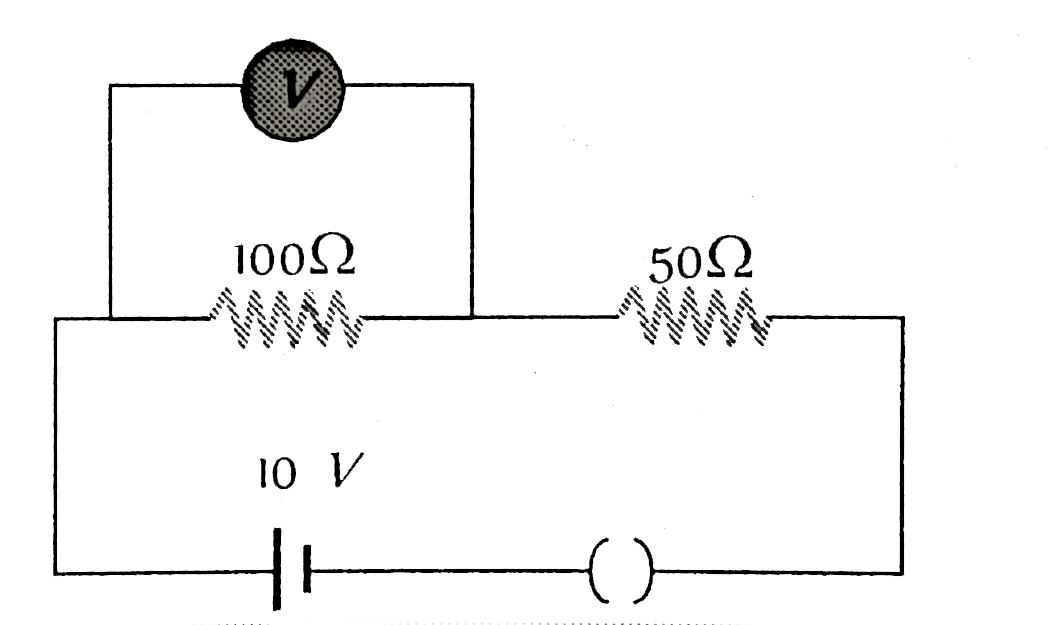The resistance of an ideal voltmeter is
zero
infinity
finite, very small
finite and large
The correct Answer is:2
To determine the resistance of an ideal voltmeter, we can follow these steps:
Step 1: Understand the Purpose of a Voltmeter
A voltmeter is used to measure the potential difference (voltage) across two points in an electrical circuit. It is designed to provide an accurate measurement without significantly affecting the circuit.
Hint: Remember that the primary function of a voltmeter is to measure voltage without altering the circuit's behavior.
Step 2: Connection of a Voltmeter
A voltmeter is connected in parallel with the component across which the voltage is to be measured. This is crucial because it allows the voltmeter to measure the voltage drop without interrupting the current flow in the circuit.
Hint: Visualize the circuit and how the voltmeter is connected in parallel to understand its effect on the circuit.
Step 3: Effect of Resistance on Current Flow
When a voltmeter is connected in parallel, it creates an alternative path for the current. If the voltmeter has a low resistance, it will draw a significant amount of current, which can affect the voltage reading across the component.
Hint: Consider what happens to the current distribution in the circuit when a low-resistance path is introduced.
Step 4: Ideal Voltmeter Characteristics
To ensure that the voltmeter does not affect the circuit, its resistance should be extremely high (ideally infinite). This means that it will draw negligible current, allowing the circuit to operate normally while still providing an accurate voltage measurement.
Hint: Think about the concept of "ideal" in physics—it's a theoretical condition that helps simplify analysis.
Step 5: Conclusion
Thus, the resistance of an ideal voltmeter is considered to be infinite. This ensures that it does not draw any current from the circuit, allowing for an accurate measurement of the voltage across the component.
Hint: Reflect on why an infinite resistance is a desirable characteristic for a measuring instrument in electrical circuits.
Final Answer
The resistance of an ideal voltmeter is infinite.
A voltmeter is used to measure the potential difference (voltage) across two points in an electrical circuit. It is designed to provide an accurate measurement without significantly affecting the circuit.
A voltmeter is connected in parallel with the component across which the voltage is to be measured. This is crucial because it allows the voltmeter to measure the voltage drop without interrupting the current flow in the circuit.
When a voltmeter is connected in parallel, it creates an alternative path for the current. If the voltmeter has a low resistance, it will draw a significant amount of current, which can affect the voltage reading across the component.
To ensure that the voltmeter does not affect the circuit, its resistance should be extremely high (ideally infinite). This means that it will draw negligible current, allowing the circuit to operate normally while still providing an accurate voltage measurement.
Thus, the resistance of an ideal voltmeter is considered to be infinite. This ensures that it does not draw any current from the circuit, allowing for an accurate measurement of the voltage across the component.
The resistance of an ideal voltmeter is infinite.
Topper's Solved these Questions
- BOOK - NARAYNACHAPTER - MOVING CHARGES AND MAGNETISMEXERCISE - LEVEL-I(C.W)58videos
MOVING CHARGES AND MAGNETISM
- BOOK - NARAYNACHAPTER - MOVING CHARGES AND MAGNETISMEXERCISE - Level-II(C.W)63videos
MOVING CHARGES AND MAGNETISM
- BOOK - NARAYNACHAPTER - MOVING CHARGES AND MAGNETISMEXERCISE - EXERCISE - 420videos
MOVING CHARGES AND MAGNETISM
- BOOK - NARAYNACHAPTER - MAGNETISM AND MATTEREXERCISE - EXERCISE - 4 (SINGLE ANSWER TYPE QUESTION)17videos
MAGNETISM AND MATTER
- BOOK - NARAYNACHAPTER - NUCLEAR PHYSICSEXERCISE - LEVEL-II-(H.W)9videos
NUCLEAR PHYSICS
Similar Questions
Knowledge Check
- Question 1 - Select One
Assertion (A) : An ammeter is connected in series of the current carrying circuit but a voltmeter is connected in parallel across those two points, potential difference between which is to be measured.
Reason (R) : Resistance of an ideal ammeter is zero but the resistance of an ideal voltmeter is infinite.AIf both assertion and reason are true and the reason is the correct explanation of the assertion.BIf both assertion and reason are true but reason is not the correct explanation of the assertion.CIf assertion is true but reason is false .DIf the assertion is false but reason is true. - Question 2 - Select One
Statement I: The resistance of an ideal voltmeter should be infinite.
Statement II: Lower resistance of voltmeters gives a reading lower than the actual potential difference across the terminals.AStatement 1 is true, Statement 2is True , Statement 2 is correct explanation for Statement 1.BStatement 1 is True, Statement 2 is True, Statement 2 is NOT a correct explantion for Statement 1.CStatement 1 is True, Statement 2 is False.DStatement 1 is False, Satement 2 is True. - Question 3 - Select One
Question Stimulus :-
The resistance of ideal voltmeter is-AZeroBVery lessCVery highDInfinite
What is the resistance of an ideal (i) ammeter, (ii) voltmeter ?
View SolutionIn the circuit figure, the voltmeter reads 30 V. The resistance of the voltmeter is
 View Solution
View SolutionAn ideal ammeter (zero resistance) and an idel voltmeter (infinite resistance) are connect as shows in Fig. 6.47. The ammeter and the voltmeter readings are
 View Solution
View SolutionIn the given circuit, the voltmeter reads SV. The resistance of the voltmeter is :
 View Solution
View SolutionIn the given circuit, the voltmeter records 5 volts. The resistance of the voltmeter in ohms is
 View Solution
View Solution

